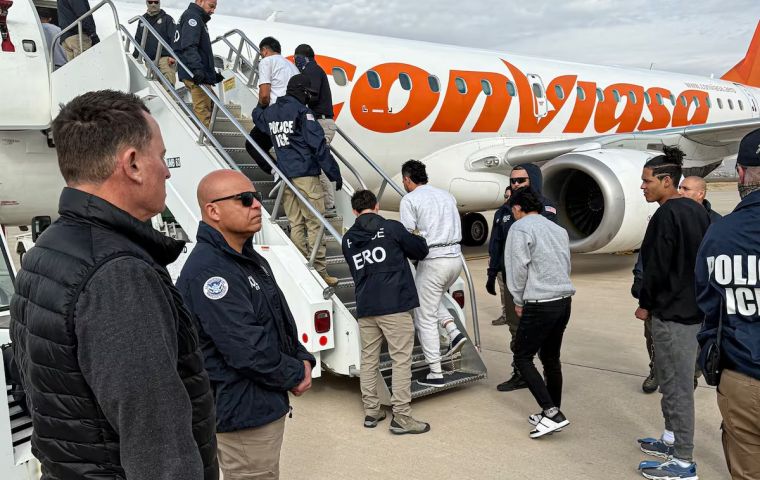MercoPress. South Atlantic News Agency
First U.S.-Venezuela deportation flights begin under Trump-Maduro agreement
 Venezuelan deportees are loaded onto a plane, in an image shared by the White House, February 10, 2025.
Venezuelan deportees are loaded onto a plane, in an image shared by the White House, February 10, 2025. Two state-owned Conviasa planes departed from El Paso, Texas, on Monday, carrying the first group of Venezuelan deportees under the agreement between United States President Donald Trump and his counterpart, Nicolás Maduro. The operation comes just two weeks after Maduro met with Trump’s envoy, Richard Grenell, in Caracas—a meeting marked by the U.S. flag flying once again at Miraflores Palace.
Trump, who has vowed to crack down on immigration, personally oversaw the operation through Grenell. “Let’s make America safe again,” the White House stated, releasing an image of deportees boarding the flights.
Read also: Trump’s envoy delivers stern warning to Maduro in Caracas as US flag displayed in Miraflores
The exact number of deportees remains unclear, as does their legal status. According to a Venezuelan government statement, some on board were linked to criminal activities, including alleged members of the Tren de Aragua gang. Upon arrival in Venezuela, authorities plan to investigate them. The Conviasa planes—each with a 114-passenger capacity—suggest that at least 220 Venezuelans were deported in this first operation.
Maduro, in his weekly program Con Maduro+, linked the mass exodus of Venezuelans to U.S. sanctions and proposed a full lifting of restrictions in exchange for halting migration. “I told Ambassador Grenell: lift all sanctions, and I guarantee no Venezuelan will leave, and those abroad will return,” he stated. Jokingly, he added, “Returning migrants will get their right to party back.”
The deportations also highlight contrasting narratives. While Trump portrays them as part of his crackdown on crime and illegal immigration, the Venezuelan government presents them as part of its Plan Vuelta a la Patria (Return to the Homeland Plan), suggesting they are repatriating victims of U.S. economic pressure.
Despite ideological differences, the Trump-Maduro dynamic appears increasingly transactional. The release of six detained Americans in Venezuela coincided with these deportations, raising speculation about further behind-the-scenes negotiations. Meanwhile, the continued renewal of Chevron’s operating license in Venezuela signals that U.S.-Venezuela relations could be evolving beyond deportation agreements.




Top Comments
Disclaimer & comment rulesCommenting for this story is now closed.
If you have a Facebook account, become a fan and comment on our Facebook Page!